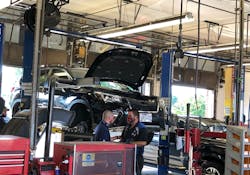It's Not 'Just' An Oil Change: Common Services Can Drive More Business
This MTD exclusive was written by Jeff Morgan, executive director of Dealer Strategic Planning, the DSP Group. He can be reached at [email protected] or (310-533-2576). For more information, visit www.20DSP.com.
Throughout my career of leadership coaching, I have been trying hard to help people remove a phrase from their vocabulary because I believe it sets limits on possibilities. That term is “just a…”
When referring to positions within a business, I sometimes hear people referred to as “just a salesperson,” “just a lube or tire tech” or even “just a small business owner.”
Let me assure you: the term “just a” does not apply to any of those roles. Each employee plays an integral part in the success your business. Let me give you an example to ponder.
Who typically sees more cars in your shop on a typical day: a master mechanic or a lube/tire tech? I’m sure you recognized that it’s your lube or tire tech. Now, think of the impact on your business when this person is performing at a high and consistent level versus someone who’s simply going through the motions. When you treat that person like he or she is “just a lube or tire tech,” you guarantee some uninspired, unproductive and ultimately damaging work.
The same thing applies to the services that you perform. How do you and your employees view an oil change? Is it “just” an oil change? Or is it viewed as the key customer count and service expectation driver that it truly is?
Think about it. What is the single most common service that your customers are going to have performed on their cars? I’m willing to bet that most drivers today recognize the need to change their oil regularly. They know this needs to be done.
The next question is where will they have this performed? It makes sense to think that the first opportunity you will have to earn a new customer will be with the most requested service. What will their experience be? Will they feel important to the business or will they feel like they were “just” another oil change?
There’s an old saying that if you treat customers special, they become special customers. Conversely, if you treat that customer like “just” an oil change, that’s all they will ever be.
So, I hope that you understand how important this service is to your customers and to gaining customer loyalty. But do you truly recognize how the oil change business can impact your bottom line? Having the right approach and attitude to this service can increase your sales and gross profit, as well.
How many of you have taken your car to the drive-through car wash? When you pull up, you typically have a menu of service options like basic wash, plus wash, and premium wash.
The basic wash lists minimal things: wash, rinse, dry. The plus wash adds some additional, desirable- sounding things: triple foam soap, spot free rinse and wax shine. The premium wash adds -- or at least what sounds like – the gold star treatment: bug removal presoak, wheel bright, hot clearcoat protectant and more!
The reality is that many people will upgrade at least one level on their car wash, just because they feel it is the right thing to do for their car based on what the menu explained. If the car wash provider looked at the service as “just” a carwash, and did not explain the benefits of the upgrade options, which option would most customers choose?
The same goes with your business and the oil change service. How you market your options and explain the benefits to customers will determine your success in increasing oil change revenue. And it all starts with the attitude that the oil change is a valuable service in your repertoire.
Your employees should treat oil change customers as equally as customers who are buying a set of tires or having major repairs preformed. Recognize that if you provide the right experience to those oil change customers, they could become those other customers.
In pricing, you want to be competitive, but you do not need to necessarily be the cheapest. Consider the entire value equation that you offer, including speed, quality and added free services like vehicle inspections, windshield cleaning, a comfortable waiting area and others. Again, it is about the experience. Customers will likely pay a little bit more for a better experience.
The next key is to not just have oil change options for the customer. You must present those options consistently, along with their benefits, every time someone comes in for an oil change. Have point-of-sale material such as posters or counter cards that you can refer to with each oil change customer. Do not leave it to chance that the customer will see or be aware of the options and benefits. Take the time, each time, to explain. Even if a customer has visited you before, do not initially assume that he or she is aware of the options. If you are consistent in your approach, before you know it, return customers will ask for the upgrade option when they walk in the door.
Are you offering high-grade oil as an option? Make sure to include more information beyond the fact that this level of oil has been designed for vehicles with around 75,000 miles or more. Explain why this is the case. These oils typically contain additives and conditioners that help shore up seals, which deteriorate over time. This, in turn, reduces oil consumption and leaks. And it can help reduce engine wear. Taking the time to explain this to a customer with a high-mileage vehicle may be all it takes for them to be willing to step up. While the customer will pay more for this service, they now will recognize the value that goes with it. And you typically will enjoy better margins with this product, as opposed to conventional oil.
Another potential step-up service is the use of synthetic oil. Granted, many vehicles today require the use of synthetic oils. And it can be a great upgrade for those that do not. While many customers just think you can go longer between oil changes with synthetic oil because it is more resistant to deterioration than conventional oil, that is not the reason they should consider it.
The best reason is performance. Synthetic oil typically offers better engine lubrication, especially in temperature extremes. This can improve overall fuel economy, as well as reduce engine wear. The long-term value of using synthetic oil can be very important to your customers, making the increased cost to them well worth the investment. Again, you will realize better margins with this service, as well, making it a win-win proposition.
Also, think of the perception of you and your business. Just as you try to position yourself as a tire professional who is able to explain the features and benefits of any given tire, you should be just as dedicated to becoming an oil service professional. The more your customers recognize your knowledge in this area, the more it builds trust in your business and your dealership’s ability to service their needs. Once they recognize your professionalism and have a positive experience on top of that, they will trust you to perform other vehicle services. That’s kind of loyalty that makes a business thrive.
A loyal customer will spend thousands upon thousands of dollars with you throughout the years. But it takes time to create loyal customers. And they can be lost in a matter of seconds. Remember that the next time customers reach out to you about doing an oil change. Will they be treated like the multiple thousand-dollar stream of revenue that they are or could become? Will you offer and explain the upgraded service opportunities that can benefit them? Or will they be treated like “just another oil change?” The choice is yours.
About the Author

Jeff Morgan
Tire industry veteran Jeff Morgan is the executive director of TEN (Training and Education Network.) He can be reached at [email protected] or (651) 846-9871. For more, see www.mtdten.com
